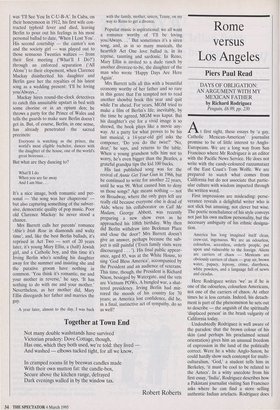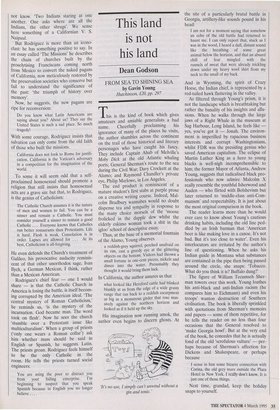Rome versus Los Angeles
Piers Paul Read
DAYS OF OBLIGATION: AN ARGUMENT WITH MY MEXICAN FATHER by Richard Rodriguez Penguin, £6.99, pp. 230
t first sight, these essays by 'a gay, Catholic Mexican-American' journalist promise to be of little interest to Anglo- Europeans. We are a long way from San Francisco where Mr Rodriguez is an editor with the Pacific News Service. He does not write with the candy-coloured razzamatazz of the East Coast's Tom Wolfe. We are prepared to watch what comes from California but do not associate that partic- ular culture with wisdom imparted through the written word.
First impressions are misleading: perse- verance reveals a delightful writer who is not slick but amusing, not clever but wise. The poetic nonchalance of his style conveys not just his own mellow personality, but the necessary ambiguity of his ethnic designa- tion.
America has long imagined itself clean, crew-cut, ingenuous. We are an odourless, colourless, accentless, orderly people, put upon and vulnerable to the foreign. Aliens are carriers of chaos — Mexicans are obviously carriers of chaos — gray air, brown water, papacy, leprosy, crime, diarrhoea, white powders, and a language full of newts and cicadas.
Here Rodriguez writes 'we' as if he is one of the odourless, colourless Americans, not one of the carriers of chaos. At other times he is less certain. Indeed, his detach- ment is part of the phenomenon he sets out to describe — the anguish of the spiritually `displaced person' in the brash vulgarity of California today.
Undoubtedly Rodriguez is well aware of the paradox: that the brown colour of his skin (and perhaps his proclaimed sexual orientation) gives him an unusual freedom of expression in the land of the politically correct. Were he a white Anglo-Saxon, he could hardly show such contempt for multi- culturalism. 'God,' a student tells him in Berkeley, 'it must be cool to be related to the Aztecs'. In a witty anecdote from his first essay, 'India', Rodriguez describes how a Pakistani journalist visiting San Francisco asks where he can find a store selling authentic Indian artefacts. Rodriguez does not know. 'Two Indians staring at one another. One asks where are all the Indians, the other shrugs'. We sense here something of a Californian V. S. Naipaul.
But Rodriguez is more than an icono- clast: he has something positive to say. In an essay called 'The Missions' he describes the chain of churches built by the proselytising Franciscans coming north from Mexico to convert the naked pagans of California, now meticulously restored by the preservation societies who conserve but fail to understand the significance of the past: 'the triumph of history over memory'.
Now, he suggests, the new pagans are ripe for reconversion:
Do you know what Latin Americans are saying about you? About us? They say the United States is such a sad place. So much tragedy!
With some courage, Rodriguez insists that salvation can only come from the old faith of those who built the missions.
California does not look to Rome for justifi- cation. California is the Vatican's adversary in a competition for the imagination of the world.
To some it will seem odd that a self- proclaimed homosexual should promote a religion that still insists that homosexual acts are a grave sin: but that, to Rodriguez, is the genius of Catholicism:
The Catholic Church assumes it is the nature of men and women to fail. You can be a sinner and remain a Catholic. You must consider yourself a sinner to remain a good Catholic . .. Everyone knows that Catholics run better restaurants than Protestants. Life is hard. Flesh is weak. Consolation is in order. Lapses are allowed for ... At its best, Catholicism is all-forgiving.
He even defends the Church's treatment of Galileo, his provocative audacity reminis- cent of that other unorthodox sage, Ivan Ilych, a German Mexican, I think, rather than a Mexican American.
Rodriguez's chief fear — one I would share — is that the Catholic Church in America is losing the battle, is itself becom- ing corrupted by the American ideal. 'The central mystery of Roman Catholicism,' he reminds us, 'is the mystery of the incarnation. God became man. The word took on flesh'. Now he sees the church `stumble over a Protestant issue like multiculturalism'. When a group of priests Only one wears a Roman collar') ask him whether mass should be said in English or Spanish, he suggests Latin. The priests groan. Rodriguez feels himself to be the only Catholic in the room. He tells the priests turned social engineers:
You are using the poor to distract you from your failing enterprise. I'm beginning to suspect that you speak Spanish because in English you no longer believe ....



























































 Previous page
Previous page